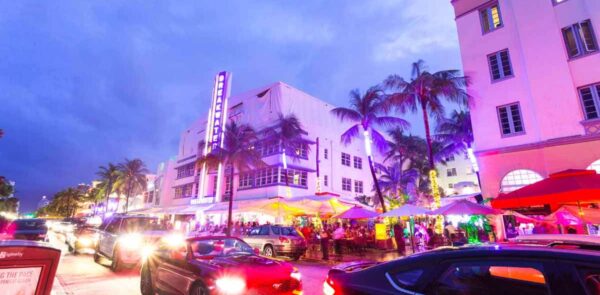
Jump to a section:
Nestled along Florida’s Gulf Coast, Cape Coral is famous for its laid-back coastal lifestyle, abundant waterways, and thriving small-business scene. Whether you run a waterfront restaurant on Del Prado Boulevard or manage a local home services company, attracting customers in such a sun-kissed, competitive environment requires a smart and efficient marketing strategy. One proven method is setting up a local pay-per-click (PPC) campaign—an approach that lets you reach customers actively searching for what you offer, all while staying within your targeted area.
In this guide, we’ll walk you through the essential steps of launching your first local PPC campaign in Cape Coral. From researching local keywords to crafting compelling ads and measuring performance, we’ll ensure you have the insights needed to make your digital marketing dollars work harder. Let’s dive in.
Why Local PPC Matters in Cape Coral
Embracing the Local Mindset:
Cape Coral’s local economy is powered not just by tourists looking for a tropical getaway but also by year-round residents who rely on nearby businesses for dining, shopping, and professional services. When residents or visitors search online for “restaurants near me,” “boat rentals in Cape Coral,” or “best landscaper in SWFL,” it’s a prime opportunity to appear at the top of those results with a focused PPC campaign.
Benefits of Targeting Cape Coral:
- Geo-Specific Ads: Instead of casting a wide net across Florida, you can zero in on specific neighborhoods or ZIP codes in Cape Coral, ensuring your ad budget reaches the right audience.
- Immediate Visibility: PPC campaigns show your ads on platforms like Google or Bing almost immediately after launch, allowing you to quickly test and refine strategies.
- Cost-Effectiveness: With targeted keywords and geographic boundaries, you reduce wasted ad spend on irrelevant clicks—maximizing return on investment.
Local PPC can feel intimidating if you’re new to digital advertising, but the effort is well worth it. By following a clear, step-by-step plan, you’ll be able to connect with motivated Cape Coral consumers right when they need your services.
Step 1: Research and Define Your Local Keywords
Why Keywords Matter:
Keywords are the backbone of any PPC campaign. They’re the words and phrases people type into search engines to find products, services, or local businesses. For Cape Coral, these might include specific references to the city or local landmarks.
How to Find the Right Keywords:
- Start With Basic Industry Terms: If you’re a real estate agent, initial keywords might be “Cape Coral real estate,” “homes for sale in Cape Coral,” or “SWFL realtors.”
- Add Location Modifiers: Pair your primary service with local markers, such as “Gator Circle,” “Burnt Store Road,” or “Cape Harbour.” This tactic narrows down who sees your ads.
- Use Google’s Keyword Planner: This free tool shows how often people search for specific keywords in your region and suggests related terms you might not have considered.
- Check Out Competitor Ads: Searching for your product or service online can reveal which keywords your rivals are using. Incorporate relevant terms into your own list.
Once you’ve compiled your keyword list, group them by themes or categories—for instance, “property management,” “vacation rentals,” or “luxury waterfront homes.” This helps you align ads to the most relevant searches, improving your click-through rates and overall campaign performance.
Step 2: Craft Compelling Ad Copy and Creative
Why Ad Copy Matters:
Even if your keywords are spot-on, your ads need to resonate with users. In a city that boasts more miles of canals than any other in the world, you might highlight waterfront amenities, coastal living perks, or the distinct advantages of doing business in Cape Coral.
Tips for Effective Local Ad Copy:
- Use Local References: Incorporate phrases like “serving Cape Coral families since 2010” or “proudly located in SWFL.” This signals that you’re part of the community.
- Highlight Unique Selling Points: Do you offer free boat dock inspections? Same-day AC repairs? Let customers know exactly why they should choose you over the competition.
- Include a Clear Call to Action (CTA): Whether it’s “Call now,” “Book your reservation,” or “Get a free quote,” direct instructions encourage clicks and conversions.
- Utilize Ad Extensions: Google Ads allows you to show extra details like phone numbers, location info, or site links. For a local campaign, adding your address or a direct call button can significantly boost response rates.
On social media platforms like Facebook or Instagram, you can also run PPC ads with appealing visuals. Think photos of sparkling waterways, lush palm trees, or satisfied customers enjoying the Florida sunshine—imagery that speaks to Cape Coral’s ambience.
Step 3: Set Up Geo-Targeting and Bid Strategies
Why Geo-Targeting Is Crucial:
By limiting your ads to a defined radius around Cape Coral, you ensure that only local or relevant users see your ads. This approach saves you money by preventing clicks from people outside your service area—like someone searching for “landscaper in Miami.”
Setting Up Geo-Targeting in Google Ads:
- Location Settings: In your campaign’s “Locations” tab, select “Enter another location.” Type in “Cape Coral,” and you can even refine by ZIP codes like 33904 or 33909 if you want to be extra specific.
- Radius Targeting: You can also set a radius, for instance 15 miles from your business address, capturing surrounding areas like North Fort Myers or Pine Island if relevant.
- Exclude Unwanted Areas: If you don’t serve parts of Lee County or prefer to avoid certain zones, set negative locations to block those clicks.
Choosing the Right Bid Strategy:
- Manual CPC: You manage individual keyword bids. Offers greater control but requires monitoring and adjustments.
- Enhanced CPC (ECPC): Google automatically adjusts your bids in real-time to maximize conversions. This can be a good middle ground if you still want some manual control.
- Target CPA or Target ROAS: You set a target cost per acquisition (CPA) or return on ad spend (ROAS). Google tries to find as many conversions as possible within your target range. This strategy is best once you have enough historical data to inform sensible targets.
Don’t forget to monitor your bids closely during the first few weeks of your campaign. If your budget is getting used up by midday, lower your bids or adjust your schedule. If you’re not appearing in enough auctions, slightly increase bids for high-priority keywords.
Step 4: Optimize for Mobile Users
Why Mobile Optimization Matters in Cape Coral:
Due to its scenic waterways and outdoor lifestyle, many Cape Coral residents and visitors rely on smartphones to discover local businesses on the go. Ensuring your site and ads are mobile-friendly is paramount.
Key Ways to Optimize for Mobile:
- Responsive Landing Pages: Your website should look great on a phone or tablet, with easy navigation and clear calls to action.
- Click-to-Call Extensions: In a local setting, phone calls can be the quickest path to booking an appointment or getting details about your offerings. Adding a one-tap call button in your ads can boost conversions.
- Fast Load Times: Cape Coral users might be browsing while in transit—so slow-loading pages can lead to high bounce rates. Compress images, simplify code, and leverage mobile-friendly designs.
Remember to test your ads, landing pages, and the overall user flow from a mobile perspective. That first impression often determines whether a user will become a customer or click away for good.
Step 5: Track Conversions and Fine-Tune Your Campaign
Why Tracking Matters:
Without concrete data on how many leads, calls, or online sales your campaign generates, you’re essentially guessing about its success. Conversion tracking provides the insights you need to identify what’s working and where improvements are needed.
Common Conversion Types in Local PPC:
- Phone Calls: Set up call tracking so you know how many ad-driven calls you receive, as well as the call duration. Google Ads call extensions can help you track this automatically.
- Form Fills: If you collect leads through a contact or quote form, add a tracking code to the “Thank You” page, triggering a conversion event once someone completes the form.
- In-Store Visits: Some advanced setups allow for tracking foot traffic when people have location tracking enabled on their devices. While not always straightforward, it’s an option to consider.
- Online Sales: If you sell products online, track e-commerce transactions directly within your platform’s analytics or link to Google Ads conversion tracking.
Ongoing Campaign Optimization Strategies:
- Review Search Terms: Check actual search queries to see if your keywords match user intent. Use negative keywords to block irrelevant traffic.
- Adjust Bids: Raise bids on high-performing keywords. Lower or pause bids on keywords that drain your budget without converting.
- Rotate Ad Variations: Test different headlines, descriptions, and CTAs to discover which combination resonates best with Cape Coral audiences.
- Refine Geo-Settings: If you notice lots of clicks from areas beyond Cape Coral that don’t result in business, tighten your radius or add negative locations.
PPC is a continuous process of learning and adjusting. Setting aside time each week to examine metrics—like cost per conversion, click-through rate, and total conversions—will empower you to optimize and keep your campaign profitable.
Local PPC Best Practices for Cape Coral
Play Up the Waterfront Lifestyle:
Leverage Cape Coral’s unique draws, such as its 400+ miles of canals, year-round boating opportunities, and community events like the Cape Coral Farmers’ Market. Highlighting these attributes in your ad copy can pique local interest.
Align With Seasonal Trends:
Cape Coral sees seasonal fluctuations in tourism. If you offer boat rentals or fishing charters, for example, your busiest time might be during high tourist season. Adjust your budgets and bids accordingly to capitalize on visitor traffic while staying consistent for local customers in off-peak months.
Stay Engaged With the Community:
Run promotions or ad extensions that reference events like the Cape Coral Coconut Festival or Red, White, & Boom. Tying your offers to local happenings can drive extra clicks from people actively searching for information about those events.
Combine With Other Local Efforts:
A PPC campaign works best alongside other marketing tools. Keep your Google Business Profile updated with current hours, positive reviews, and photos. Maintain an active presence on local community pages or local Facebook groups. The synergy of multiple channels strengthens trust and recognition.
Putting It All Together
Launching a local PPC campaign in Cape Coral can open the door to a steady flow of customers—both residents and tourists—who are genuinely interested in your products or services. By conducting thorough keyword research, tailoring ad copy to local nuances, and continuously optimizing for performance, you’ll harness the power of focused digital advertising to boost conversions and revenue.
Remember:
- Start with clear objectives—what do you want people to do once they see your ads?
- Keep your budget flexible initially and be ready to pivot based on real-time data.
- Maintain a local focus, referencing Cape Coral’s distinct landmarks, events, and lifestyle perks.
- Track everything—calls, form fills, online purchases—to see real ROI.
At Emulent, we’re passionate about helping local businesses succeed through tailored digital marketing strategies. From designing geo-targeted campaigns to optimizing your landing pages, our team understands the nuances of advertising in Cape Coral. If you need personalized support to set up your first local PPC campaign—or fine-tune an existing one—reach out to us. Together, let’s make sure the right customers find your Cape Coral business, exactly when they’re looking.


